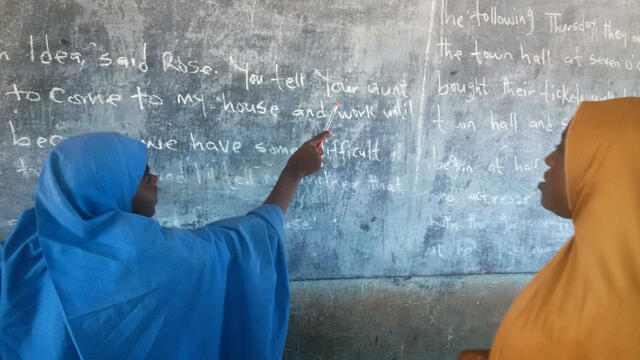Hauwa’u Alkali Bulama says she has not just one but three favorite subjects in school.
“I love English, mathematics and social studies,” the 14 year old explains. “I know these subjects will help me pursue my dream of becoming a doctor.”
But Hauwa’u’s dream was harshly interrupted when Boko Haram violence pushed her family from their village in Nigeria’s northeastern Yobe state.
Boko Haram, the world’s deadliest terror group, has killed thousands, abducted at least 2,000 women and children, and uprooted over 2.5 million since 2014. Hauwa’u’s family had to flee to neighboring Bauichi state.

Hauwa’u was away from a classroom for nearly a year. Her father’s earnings as a shoemaker — less than $1 a day — could barely feed his family of eight, let alone send his children to school.
Then Hauwa’u’s parents heard about a free learning center nearby where their daughter could catch up on the lessons she missed because of the fighting. The International Rescue Committee runs 42 such centers to empower girls in areas of northeastern Nigeria that were already suffering widespread poverty and unemployment before the conflict began.
At the centers, girls not only study reading and math but learn critical skills that will help them build their confidence, cope with stress and adjust to life far from home. They also take health classes where they can get answers to typical questions adolescent girls have, such as about managing their periods.
Vocational training is also available to the students. Working with local artisans who volunteer their time, girls learn marketable job skills — such as making pasta, blending cosmetics and applying henna — that they’ve said they want to master. Equipping girls with new skills like these helps provide them hope for their future.
Hauwa’u graduated after nine months at the learning center and enrolled in fifth grade at a local primary school. Though she is behind for her age due to the conflict, she’s grateful to have a peaceful place to learn and grow. She remains hopeful that she can continue her studies to one day become a physician and help people who are sick or malnourished.
“I am very happy,” Hauwa’u says of her new school. “I’ve made new friends and my teachers are always willing to put me on the right track.”
Education Crisis Response learning centers like the one Hauwa’u attended receive funding from the U.S. Agency for International Development.